Press releases
Prime Minister Pashinyan visits Atlantic Council, delivers speech and answers experts’ questions
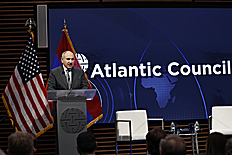 1670x1113px - 594 Kb
1670x1113px - 594 Kb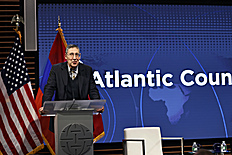 1670x1113px - 658 Kb
1670x1113px - 658 Kb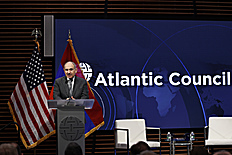 1670x1113px - 643 Kb
1670x1113px - 643 Kb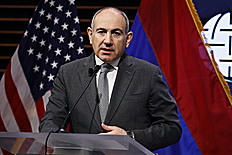 1113x1670px - 614 Kb
1113x1670px - 614 Kb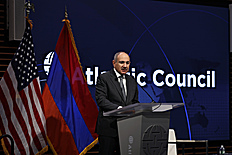 1670x1113px - 436 Kb
1670x1113px - 436 Kb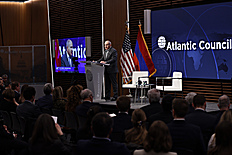 1670x1113px - 627 Kb
1670x1113px - 627 Kb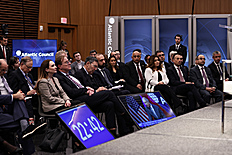 1670x1113px - 767 Kb
1670x1113px - 767 Kb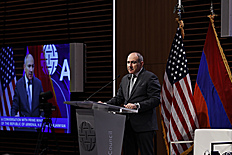 1670x1113px - 599 Kb
1670x1113px - 599 Kb 1670x1113px - 716 Kb
1670x1113px - 716 Kb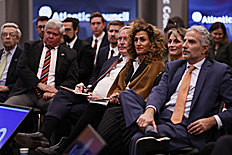 1670x1113px - 714 Kb
1670x1113px - 714 Kb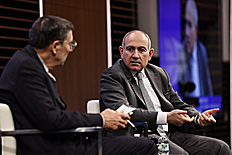 1670x1113px - 603 Kb
1670x1113px - 603 Kb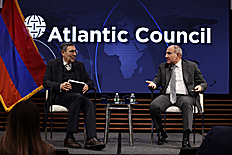 1670x1113px - 540 Kb
1670x1113px - 540 Kb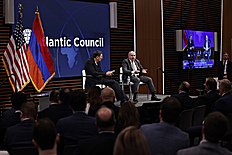 1670x1113px - 687 Kb
1670x1113px - 687 Kb 1670x1113px - 710 Kb
1670x1113px - 710 Kb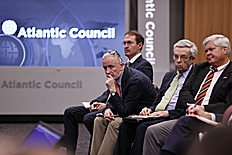 1670x1113px - 743 Kb
1670x1113px - 743 Kb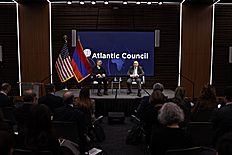 1670x1113px - 643 Kb
1670x1113px - 643 Kb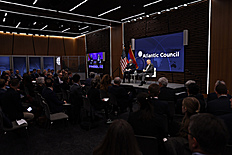 1670x1113px - 662 Kb
1670x1113px - 662 Kb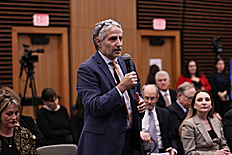 1670x1113px - 720 Kb
1670x1113px - 720 Kb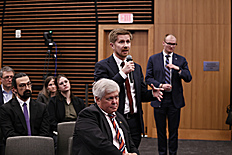 1670x1113px - 792 Kb
1670x1113px - 792 Kb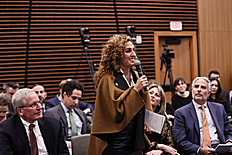 1670x1113px - 921 Kb
1670x1113px - 921 Kb 1670x1113px - 914 Kb
1670x1113px - 914 Kb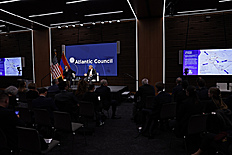 1670x1113px - 697 Kb
1670x1113px - 697 Kb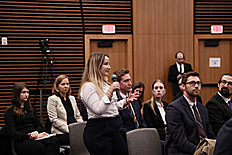 1670x1113px - 756 Kb
1670x1113px - 756 Kb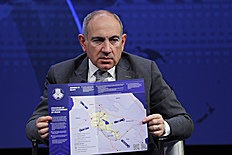 1670x1113px - 583 Kb
1670x1113px - 583 Kb
more 21 photos
Prime Minister Nikol Pashinyan visited the Atlantic Council in Washington, D.C., where he delivered a speech. The Prime Minister first answered questions of John Herbst, Senior Director of the Atlantic Council’s Eurasia Center and former U.S. Ambassador to Uzbekistan and Ukraine. The meeting was then held in a closed format, during which Nikol Pashinyan answered a number of experts’ questions.
Below is the full text of Prime Minister Pashinyan’s speech and the Q&A with John Herbst.
Ambassador John Herbst, Senior Director of the Atlantic Council’s Eurasia Center - Today I am honored to host His Excellency Mr. Pashinyan, Prime Minister of the Republic of Armenia. Today will have a very interesting talk. The Prime Minister has led his country since the Velvet Revolution of 2018, which brought great democratic change to Armenia. Since then, he has led his country through a turbulent period, holding snap elections in 2021. A journalist by trait, Mr. Prime Minister is now trying to write a new history for Armenia and its future. A future where there will be peace and normal relations with neighbors, respect for sovereignty and territorial integrity, and a future where the United States, the West, and Europe will be interested in cooperating with Armenia. There is already a new US-Armenia strategic partnership, which is a great step forward for the future of Armenia and Washington-Yerevan relations. Please accept my congratulations, Prime Minister Pashinyan and Foreign Minister Mirzoyan, on this development. This cooperation is clearly in the interests of both Armenia and the United States. So, I invite Mr. Prime Minister to speak from the podium, after which a discussion will take place.
Prime Minister Nikol Pashinyan - Dear Mr. Herbst, esteemed representatives of think tanks,
I am glad for the opportunity to discuss the foreign policy of the Republic of Armenia with you. The Government of Armenia has adopted a foreign policy which we call balanced and balancing foreign policy. At the core of this policy is levelling up the independence and sovereignty of the Republic of Armenia.
When we were thinking about what the formula for levelling up the independence is, we came to the conclusion that it means replacing dependence on the few with dependence on the many. Now we are acting within the framework of this formula. Of course, we are focused first of all on our regional relations, because how independent, secure we will be, how reliable our security system will be, depends on what kind of relations we will have in our region.
You know that two of our country's four borders are completely closed, I'm talking about our borders with Turkey and Azerbaijan. We have two more borders, with Georgia and Iran. Of course, these two borders are very important for us, we cooperate, we have good relations with our two neighbors, Georgia and Iran, but we want to open a new era in our relations with Turkey and Azerbaijan.
In previous years, we have made tremendous progress in the peace process with Azerbaijan. In order for this progress to be understandable to you, you know that now we are discussing the draft peace treaty with Azerbaijan, and now we have reached full agreement on 15 out of 17 points of that treaty, and there are two points left on which we still need to reach a final agreement. We hope to complete this process as soon as possible. Of course, we are working with Azerbaijan in a bilateral format, but obviously the attention and support of the international community would be very useful in creating a proper environment for achieving sustainable peace.
We have a fairly active dialogue with Turkey. In recent years, I have had several meetings with the Turkish President, I was present at the inauguration of the Turkish President, we recently met in New York within the framework of the UN General Assembly, and we have a very specific agreement to open our border in the first phase to citizens of third countries and people holding diplomatic passports, and we hope to achieve the implementation of this agreement as soon as possible. We are working in that direction.
On the other hand, we are deepening cooperation with other regional partners, I mean with Georgia and Iran. Of course, there is an international situation that hinders the deepening of relations with our neighbors, and these circumstances are known to everyone, I will not mention them. But I think we are successful in taking into account all these circumstances, and on the other hand, to develop relations with our neighbors. Of course, we hope that there will be a breakthrough in our regional situation when we manage to finalize and sign the peace treaty with Azerbaijan, as well as achieve normalization of relations with Turkey, which will not only completely change the regional situation, but also, I think, will have a very tangible and significant impact on the international situation.
We continue to remain a member of the Eurasian Economic Union. I would assess our relations within the Eurasian Economic Union as normal. The Eurasian Economic Union is functioning and we work within its framework. On the other hand, we have suspended our participation in the CSTO, which was our main security partner. The reason for this decision was the situation when the CSTO failed to fulfill its obligations to guarantee the security of the Republic of Armenia.
In general, I must say that now we are in the process of diversifying our foreign relations in all areas, from the economy to security.
You know that we are deepening our relations with the European Union, and last year something very important happened in our relations with the European Union. Since 2022, a civilian monitoring mission has been deployed on the Armenia-Azerbaijan border, and this is the first time that the European Union has been involved in any way in the security agenda of the Republic of Armenia. We are developing cooperation with the European Union. We recently launched a dialogue on visa liberalization, and we hope to conclude it as soon as possible.
The European Union has made another very important decision by including Armenia in the European Peace Facility, which is also a very important political decision. Recently, we signed the Charter of Strategic Partnership with the United States, which is also a very important decision. We hope to open a new page in relations with the United States.
We are actively working in terms of foreign policy, and the implementation of a balanced and balancing foreign policy is in the process. I think we are doing it quite effectively. Honestly, I can say that despite all the challenges, we have been able to increase the level of our independence and sovereignty, and I usually say that Armenia is becoming an increasingly independent country, which is very important. It opens up new opportunities for us, but on the other hand, of course, it brings new challenges.
Obviously, these days there are many challenges in international politics, in particular for Armenia, which we feel, but on the other hand we see that new opportunities are opening up, and our task is to manage all the challenges and use the opportunities as much as possible.
I would like to draw the attention of this audience to a very important topic, which is democracy. It is very important to emphasize the fact that Armenia is now a striving democracy. This is very important and the international community acknowledges this fact. I think that this circumstance, I mean democracy, has a very important impact on our foreign policy, because when a country is democratic, it will obviously try to deepen cooperation with all other democratic countries, and we hope that this aspiration of ours will be reciprocal. In fact, we see it is, and appreciate it.
We will continue the agenda of democratic reforms. Of course, as everywhere, democracy brings challenges, but it also opens up opportunities, and we are trying to manage all the challenges, including internal ones, and use all the opportunities to develop our country, first of all keeping the security agenda in the focus.
But we see prosperity and happiness, freedom, protection of human rights, independent judiciary and, in general, the success of our citizens the most important continuation of security. We want them to feel that democracy is truly a factor that is capable of ensuring security, prosperity, more and more opportunities for all citizens and all people living in Armenia. We hope that as a result of these reforms, Armenia will become a more attractive country for investing, living, visiting. This is our policy that we are trying to promote.
Of course, we feel that the visibility of Armenia as a democratic country is growing, which is very encouraging, but on the other hand, of course, we hope to ensure more visibility, to receive more support from our international partners, to make Armenia’s success story in democracy, the history of challenges and security threats more visible to the international community, which I think can and will be a factor of stability and peace for our country and the region. I tried to present a general picture of our country and our region and now I am ready to answer all your questions. Thank you.
Ambassador John Herbst, Senior Director of the Atlantic Council’s Eurasia Center – Mr. Prime Minister, thank you for this comprehensive remarks. I will have a brief conversation with Mr. Prime Minister, 15 minutes, after which I will give the floor to the audience. It seems that you have already answered my first question. I want to ask why you are so determined to pursue peace with Azerbaijan. But I would like to ask another question. I think you have given convincing reasons for your path to peace, but was it easy to convince the people of Armenia to follow this path?
Prime Minister Nikol Pashinyan – You know, it is obviously impossible to have real and growing independence, prosperity and security without peace. It is simply impossible. In Armenia, people and political forces are discussing how is it possible and what is the most reliable tool to ensure the security of our country and people. This is a very urgent and important question indeed. Our answer is that peace is the only reliable tool for security, the only reliable tool for prosperity is peace.
Peace is key even for democracy, because we cannot have democracy in an environment of war. I can say that due to historical factors, people in Armenia are not very optimistic about the peace agenda. But on the other hand, if you were to ask me whether I am optimistic or pessimistic, I would answer that question that I do not think we should be optimistic or pessimistic, we should be active, creative and continuously work towards the implementation of that agenda.
No one can guarantee that the process will be successful, the only guarantee for it is persistent work, being creative and proactive, not giving up and continuously working to achieve the desired goal. Obviously, the potential benefits of peace are important not only for the people living in Armenia, but for the entire region, even the international community will benefit from that peace.
So, we perceive this process as our contribution to international peace, because that is how world peace and stability are formed, when as many stakeholders of international relations as possible contribute to this cause, work in that direction. And we look at this process from that perspective, it is not only our duty to our citizens, to our region, but it is our duty to the international community, to international stability and peace.
We hope that the international community will also look at this process from that perspective. We expect to receive the support of our international partners, their encouragement to continue this path. This is the reason why we are trying to explain all the nuances of our intentions to our international partners.
Ambassador John Herbst, Senior Director of the Atlantic Council’s Eurasia Center – Thank you. You mentioned that in the negotiations with Azerbaijan you have reached an agreement on 15 out of 17 points of the peace agreement. 2 still remain. Being honest, but remaining diplomatic, I think that the negotiations will last a long time if the authorities in Baku are not interested in a win-win peace, as your Government approaches the issue. Please talk about those two points on which an agreement has yet to be reached and the prospects for reaching an agreement.
Prime Minister Nikol Pashinyan – One of the points concerns the deployment of third-party forces along the border of Armenia and Azerbaijan. Azerbaijan proposes to have a ban on the deployment of third-party forces along the border, meaning the European Civilian Monitoring Mission. We take note of this desire of Azerbaijan and have made our own proposal, which implies applying this point only to demarcated sections of the border. In other words, if we have demarcated a given sector, it means that no third-party force should be present there. So, we have submitted our proposal in a written way and are waiting for Azerbaijan's response.
The other point concerns the complaints filed against each other in legal institutions. The idea is to call back all these complaints. In general, we are not against this idea either, but our proposal is not only to call back these complaints, but also not to raise these issues in bilateral relations. Otherwise, a strange situation may arise when, for example, an issue is called back from an international institution, but one of the parties tries to put this issue on the table in bilateral relations and one of the parties could use this issue to provoke escalation. In that case, it will no longer be possible to transfer this issue to international institutions. We are not against this idea either. Our proposal is to end further discussions on conflicting issues and open a new era of bilateral relations, starting from a new and clean page.
If you noticed, this means that all important issues of the draft peace treaty have already been agreed upon. There were very deep and sensitive topics in that draft, but there is already agreement on all these issues. For example, Armenia and Azerbaijan agreed to recognize each other's territorial integrity, based on the borders of Soviet Armenia and Soviet Azerbaijan.
We have agreed to have a provision that Armenia and Azerbaijan have no territorial claims against each other and will not raise such claims in the future. This is actually the cornerstone for the future peace and everything is agreed for it. I am saying this, because it makes it obvious that now peace is more than reachable, and now only political will is needed to finalize the draft peace treaty, sign it and achieve sustainable peace.
Ambassador John Herbst, Senior Director of the Eurasian Center at the Atlantic Council - You also recognize the importance of normalizing relations with Turkey. There has been clear progress towards achieving that goal, but it has not yet been reached. What are the prospects for normalizing relations with Ankara?
Prime Minister Nikol Pashinyan - We will continue and continue that dialogue. I guess that Armenia and Turkey have never been involved in such an active dialogue as they are now. In fact, there are no obstacles to communication with Turkey and we are in constant dialogue. Our foreign ministers meet and talk continuously, our representatives are in constant touch, and actually, we are working very actively and there is a common understanding of what needs to be done. But of course, there are many nuances and some final efforts are needed to achieve a real result. We hope that the result will be there very soon.